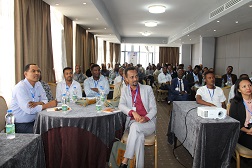Quality English education is essential for opening educational and economic opportunities for Ethiopian students and it is crucial for Ethiopia to achieve its long-term development goals.
Well-trained English educators versed in modern, research-backed, student-centered teaching methodologies at the university and secondary levels are the key to improving the quality of English education in Ethiopia.
The U.S. Embassy in Ethiopia, in collaboration with the British Council and Addis Ababa University’s School of Journalism and Communication, organized a five-day “English Language Improvement Center and Massive Open Online Course Facilitator Training” for coordinators of the English Language Improvement Centers at Ethiopia’s 47 public universities and members of Ethiopian English Language Professionals Association. The training introduced educators to modern, research-backed, student-centered teaching methods and skills to implement effective, high engagement English instruction in the university and secondary school classrooms.
Three English Language Fellows (EL Fellows) currently based at Ethiopian universities helped lead the training. Since 2002, more than twenty highly qualified U.S. English educators have participated in a ten-month-long EL Fellow program since 2002, helping Ethiopian English educators improve their curricula and develop stronger teaching methodologies.
The training also introduced the ELIC coordinators and other educators’ to the facilitation of Massive Open Online Courses (MOOCs) Camps, in which groups of participants take an online course at the same time and meet in-person or online to discuss what they have learned together. The U.S. government and British Council offer large libraries of MOOCs on how to improve the teaching and learning of English through its American English and British Council websites.
This workshop and these programs are examples of how the U.S. Embassy in Ethiopia has been investing in English teacher training, both online and in classrooms, as part of our 120 years of collaboration with Ethiopian partners in education and health, agriculture and food security, science and the environment, and many other areas to improve the lives of all Ethiopians.

